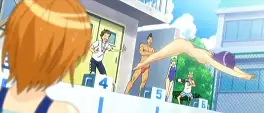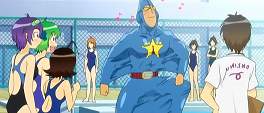Bright, colourful and full of barely concealed nudity, Umisho is a raucous and energetic series built upon simple principles that are well executed. Far from being intelligent, thought-provoking or in-depth, each episode kicks meaningful story-telling and character development to the curb and manages to be a thirteen episode onsen and beach scenario combined.
Beginning with the only iota of character justification in the entirety of the show, Kaname Okimura joined the school swimming club to learn how to swim after a run-in with a supposed mermaid and nearly drowning in his earlier years. With that pesky plot out of the way, the series gets down to basics and has young women losing their clothing at every available opportunity. Ostensibly the series follows the swimming team of Prefectoral Umineko Shougyou High as they compete and subsequently win local and regional tournaments; however this is mostly superfluous to the aforementioned nudity. Not one to be entirely sexist, the swim team captain is a bronzed, muscled specimen of a man who strips off with more frequency than the women although this stems from his naturist tendencies rather than the women who are ordinarily victims of circumstance.
Umisho is an absolute blast to watch by maintaining a constant hyperactivity that rarely lets up, mostly championed by the green-haired mascot of the series, Amuro Ninagawa. Her effervescent, frequently naive demeanour owes much to her aesthetic ancestor, Yotsuba Koiwai from the Yotsuba&! manga, although Amuro's demeanour is a more teenage and skewed version of Yotsuba's off-the-wall craziness. Amuro's dauntless predilection for swimming naked and facing most everything with an ear-to-ear grin drives the first half of the series forwards before the raw spirit of the competitions take over. Indeed, it's difficult to peg any one of Umisho's characters as a protagonist when the dynamic works very much as a group while still maintaining individuals. Comprised mostly of women in various states of endowment and a clutch of men ranging from perverted to butchly effeminate, Umisho's cast is at its best when thrown together and liberally stirred.
Most all of the comedy in the series is the sort of naughty, bike-shed humour that manages to walk the fine line between perverse and racy; even the token rugby-ball shaped degenerate is used sparingly and is most always swiftly put down in his endeavours. While most of the laughs come from frequent loss of female clothing, the aforementioned captain adds to this by wishing to shave the entirety of the swimming club or frequently dressing in drag. Umisho is acutely aware of the 5-minute attention span audience it is aiming for and segues the slow and potentially emotional moments with further slapstick debauchery, proving time and again that it never wishes to take itself too seriously.
If there is anything to detract from the series it's the almost brutal lack of depth, ironic in a series set primarily in swimming pools. The first half of the series is taken up with shooting from one far-fetched scenario to another while the latter half is a non-stop competition push and while easy to get swept up in all of it, it's hard not to want a little more in the way of development of either characters or plot. The most accomplished the series gets with its storytelling is when extolling the history of the captain-in-all-but-name, Momoko Orizuka (or simply "Zuka"). Telling the story from two different persons, one embellished and riddled with fallacies, the other short and dismissive, it demonstrates a device rarely used so well, however simplistic the story behind it may be. To its credit, Umisho never belittles the audience by repeatedly hammering at the most obvious of plot points and rarely does one outstay its welcome (although the initial justification of Kaname is thankfully resolved in the final episode rather than left open).
The art-style is lifted almost entirely from the source manga and the most obvious artistic signature is the complete lack of nose definition when viewed straight on; in profile the typical ski-jump noses return but it certainly takes a while to understand this is intentional rather than an animation shortcut. The animation is used judiciously and the simple but easily identifiable character designs add to this, however deformations both intended and budget-saving are a little too common. Sonically, the series is bizarrely engaging with an invigorating opening song used at important points throughout, through to the cacophony of sound effects including swinging breasts, snapping swim-suits, exposed flesh and regular exclamations.
Umisho is a veritable riot to watch and only the most jaded or cynical of viewers would not find their spirits lifted even slightly by the boundless enthusiasm in animated form. It never tries to be anything more than it is, and manages to be itself admirably, sticking with a formula without wearing it out; it is the very definition of a perfect summer show.











